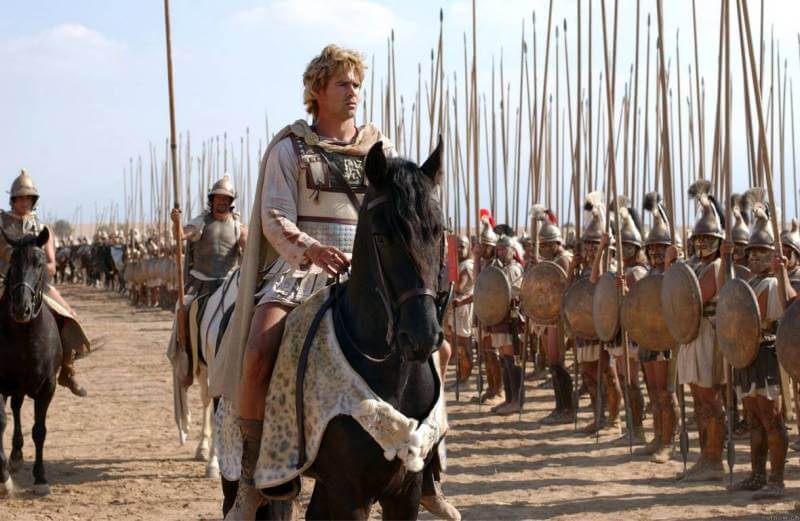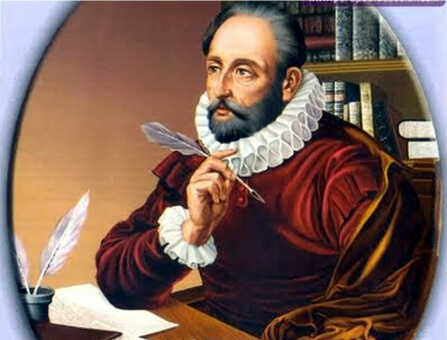History is full of people who marked a turning point in the evolution of humanity. Today, the world is what it is thanks to your thoughts, ideas, or actions, with a significance that often escapes our knowledge. To pay tribute to them, here’s a list of the 47 most important historical figures.
Of course, our selection is incomplete, as we could easily choose hundreds of heroes, writers, philosophers, and scientists from each country. Even so, this is a good starting point to get to know their stories and concerns. Are you ready?
The most important historical figures
Before we begin, we must first warn you about something: Our list doesn’t revolve around famous people because of their ethics, but rather because of the consequences that their ideas or actions have generated. While many of them changed the landscape for the better, others did nothing more than sow darkness.
Also, note that the list isn’t ordered according to importance. Each of the figures is accompanied by their date of birth and death. In some cases, we include the date that’s traditionally associated with these moments. Because some of these individuals lived centuries ago, a reliable record of exact dates isn’t always available. With this in mind, let’s get started.
1. Jesus of Nazareth (4 BC – 30-33 AD)
The leading figure in Christianity, Jesus of Nazareth was a Jewish preacher who lived during the first century AD. His schism today brings together more than 2.4 billion believers, almost 1.4 billion of whom are Catholics. His teachings have been the center of attention of theologians for two millennia. Jesus was born in Bethlehem in Judea and, according to tradition, was a descendant of King David.
2. Muhammad (570 – 632)
In the Islamic religion, Muhammad is the last of the prophets (who is preceded by Jesus, Moses, and Abraham, among others). According to tradition, the prophet founded Islam after a revelation from the archangel Gabriel in the cave of Hira. Today, there are more than 1.8 billion Muslims worldwide.
3. Christopher Columbus (1451 – 1506)
This navigator and cartographer served the Crown of Castile and directed the exploration that would result in the discovery of America. The Modern Age, and globalization along with it, began on October 12, 1492, at which time he disembarked on Guanahani Island (present-day Bahamas). He made a total of four trips before he died on May 20, 1506.
4. Julius Caesar (100 BC – 44 BC)
Gaius Julius Caesar was one of the most important politicians and soldiers in ancient Rome. His control of the Republic was surrounded by controversy and betrayal.
One of his greatest achievements was the Gallic War, which would extend Roman territory into parts of what are now France, Belgium, Switzerland, Germany, and the Netherlands. A plot hatched by some senators put an end to his life.
5. Alexander the Great (56 BC – 323 BC)
Alexander the Great was the king of Macedonia until his death. Aristotle was in charge of his education, and his reign is considered by historians as the beginning of the Hellenistic Period. His actions were an inspiration to other important historical figures such as Julius Caesar and Napoleon Bonaparte.
Alexander the Great is one of the most important heroic figures of antiquity.
6. Plato (427 BC – 347 BC)
Plato is one of the most important philosophers in the history of philosophy. A disciple of Socrates and a teacher of Aristotle, his ideas on politics, ethics, citizenship, law, and psychology, among others, helped consolidate the thinking of Western civilization. He founded the Academy in 387 BC, considered the first university in the West.
7. Lao Tzu (5th century BC)
Despite the unknowns surrounding his life, Lao Tzu is one of the most important historical figures of the East. He is believed to have lived between the 6th and 5th century BC, and the authorship of the Tao Te Ching, the most important work of Taoism, is attributed to him.
The Taoist philosophy is practiced in China, Japan, and South Korea, although it has millions of followers around the world.
8. Leonardo da Vinci (1452 – 1519)
The Florentine polymath Leonardo da Vinci is the main figure of the Renaissance. His contributions to science, art, music, medicine, and philosophy are unquestionable. He’s a universal icon thanks to paintings like La Gioconda or The Last Supper. He’s also known for designing sketches of what are today submarines, helicopters, and automobiles.
9. Johannes Gutenberg (1400 – 1468)
The inventor of the modern movable type printing press couldn’t be missing from this list of the most important historical figures. His invention not only allowed the spread of culture but is also considered the beginning of propaganda. This coincided with the Lutheran schism, so it was a lever of support to proclaim Protestant ideas.
10. Miguel de Cervantes (1547 – 1616)
Considered one of the most important writers in universal literature, Miguel de Cervantes is the most important author in Spanish literature. His main work, Don Quixote (1605-1615), is the first modern novel and the second most edited and translated book in the world, only after the Bible. Cervantes participated in the battle of Lepanto and was imprisoned in Algiers for five years.
11. Albert Einstein (1879 – 1955)
Perhaps the most famous physicist of all time, Albert Einstein is one of the fathers of quantum mechanics through his work on special and general relativity.
Einstein was awarded the Nobel Prize in Physics, not for these works, but for his publications on the photoelectric effect. His equation, E=mc², is undoubtedly the most well-known in all of history.
12. Adolf Hitler (1889 – 1945)
The leader of Nazi Germany is the most important historical figure of the 20th century. His ideas are synthesized in his book Mein Kampf (1925), partially written during his stay in prison after a failed coup in 1923. Adolf Hitler committed suicide along with Eva Braun in 1945 in the Chancellery bunker when the victory for the Allies was imminent.
13. Charles Darwin (1809 – 1882)
The author of The Origin of Species (1859) laid the foundations of what is now known as the theory of evolution. Today, his ideas, like natural selection, are widely accepted by science. The observations that led him to postulate his theory were made after the Voyage of the Beagle, a circumnavigation of almost five years in which he was able to travel a large part of the globe.
14. Karl Marx (1818 – 1883)
Karl Marx completely shaped political, philosophical, and economic history after his death. The current that bears his name, Marxism, along with modern communism and scientific socialism, stem from his ideas expressed in The Communist Manifesto (1848) and Das Kapital (1867). Marx focused on the idea that societies advance thanks to the dialectic of class struggle.
15. Isaac Newton (1643 – 1727)
Considered by many to be the greatest scientist of all time, Isaac Newton is the father of the law of universal gravitation and of classical physics. His contributions to calculus, mathematics, light, and optics made him a benchmark in his time. He also wrote some treatises on alchemy and theology. He died at the age of 84 due to renal colic.
16. Genghis Khan (1162 – 1227)
Genghis Khan was one of the most ambitious military leaders in history. In just a couple of years, he managed to extend the Mongol Empire thousands of kilometers, thus establishing, at least in territorial terms, one of the largest empires in history.
17. Mahatma Gandhi (1869 – 1948)
Mahatma Gandhi managed to make his mark as one of the most important historical figures due to his thinking and the establishment of nonviolent protests. One of the most important events in his life was the Salt March, which would lead to the independence of India from the British Empire. An integrationist fanatic assassinated him at the age of 78.
18. Louis Pasteur (1822 – 1895)
Pasteur is responsible for the pasteurization process, and his studies have widely contributed to the creation of vaccines, antibiotics, and sterilization processes.
His research marked a turning point in the natural sciences, especially in chemistry and bacteriology. He died in September 1895 in France, at the age of 72.
19. Galileo Galilei (1564 – 1642)
The famous astronomer is one of the founding fathers of the Renaissance scientific revolution. He made improvements to the telescope, with which he was able to carry out different experimental works. Contrary to popular belief, he wasn’t executed by the Inquisition, but sentenced to home confinement. Although there are doubts about its attribution, the phrase “And yet it moves” has passed into the history of popular culture.
20. Wolfgang Amadeus Mozart (1756 – 1791)
An undisputed genius in the history of music, Mozart is a figure who requires no introduction. He’s considered the greatest exponent of the classical style, with a wide body of work despite his early death (only 35 years old). Regarding this event, there are more than a few speculations. His work today continues to be the object of praise.

21. Aristotle (384 BC – 322 BC)
Aristotle’s works are a reference for Western political, religious, philosophical, scientific, and natural theory. He founded the Lyceum, which would be a participant in the formal birth of the peripatetic school. More than 2,000 years after his death, his thought continues to influence writers, thinkers, artists, and philosophers.
22. Michelangelo (1475 – 1564)
This Renaissance painter, sculptor, and architect is responsible for works of universal scope, such as David and the vault of the Sistine Chapel. Perfectionism was his main characteristic, which led him to have a reputation like few artists had in life. He died at the age of 88, after a career of more than 70 years linked to art.
23. Neil Armstrong (1930-2012)
The first man to walk on the moon certainly deserves a place among the most important historical figures. In July 1969, millions of viewers around the world heard the famous phrase “One small step for man, one giant leap for mankind.” Today, at the dawn of the exploration of Mars, these words resonate more than ever.
24. Sigmund Freud (1856 – 1939)
The father of psychoanalysis is one of the most important intellectual figures of the 20th century. Like other characters on this list, his life and contributions are not without controversy. Today, some of his ideas, such as the Oedipus complex, are known by a good part of humanity.
25. Joseph Stalin (1878 – 1953)
Lenin’s successor as the top figure of the Soviet Union played a leading role in the political and military events of the first half of the 20th century. Stalin died on March 5, 1953, apparently of a stroke caused by his high blood pressure.
26. Marie Curie (1867 – 1934)
Marie Curie is the most well-known scientist in popular culture, thanks to the resurgence of her discoveries in recent decades. She was the first person to receive two different Nobel Prizes, one in Physics (for her contributions to the field of radiation) and another in Chemistry (for her studies on radium and polonium). Curie died of aplastic anemia at the age of 66 in France.
27. Martin Luther King Jr. (1929 – 1968)
As an activist for the civil rights of African-Americans in the United States, his work earned him the Nobel Peace Prize in 1964. He combined these activities with his service as pastor of the Baptist church.
Martin Luther King Jr. was assassinated in Memphis in 1968, which was one of the most publicized assassinations in the country’s history. His legacy is felt to this day.
28. Napoleon Bonaparte (1796 – 1821)
Considered one of the greatest military strategists of the Modern Age, Napoleon Bonaparte played a decisive role in the political-administrative reordering of Europe at the beginning of the 19th century. He was proclaimed Emperor of the French and King of Italy. He died in May 1821.
29. Martin Luther (1483 – 1546)
Along with Calvin, Luther is the most representative figure of the Protestant Reformation and couldn’t be missing from any list of the most important historical figures. His revolution is known today as the Lutheran schism, which divided the Church into two halves forever.
30. William Shakespeare (1564 – 1616)
Considered the most important writer in the English language, Shakespeare is the author of works that today are emblematic of popular culture: Romeo and Juliet, Hamlet, Macbeth, and Othello are just some of them. In his life, he achieved great fame, although not as much as that which he obtained after his death. “To be, or not to be, that is the question” resonates in the ears of all his admirers.
31. Pythagoras (570 BC – 495 BC)
Among other things, since ancient times, he has been credited with authoring the Pythagorean theorem, the theory of proportions, the sphericity of the Earth, Pythagorean tuning, the five regular solids, and the identity of the morning and evening stars. His ideas were classified as Pythagoreanism, and they strongly influenced all philosophers after his death.
32. George Washington (1723 – 1799)
George Washington was one of the founding fathers of the United States and the country’s first president. He had a leading role in the ratification of the United States Constitution and in the victory of the patriots in the War of Independence. He’s considered a hero in his country, where his legacy is vividly remembered.
33. Lenin (1870 – 1924)
Vladimir Ilich Ulyanov, better known as Lenin, was a Russian politician, revolutionary, and philosopher considered the greatest exponent of the October Revolution of 1917. His ideas are called Marxism-Leninism, or just Leninism, and they continue to have a great impact both politically and economically.
34. Buddha (5th century BC)
Siddhartha Gautama, better known as Buddha, was a religious ascetic teacher who lived in South Asia around the 5th century BCE. C. He’s believed to have been born in what is now Nepal, although his life is built on many legends and myths. He’s the founder of what is now known as Buddhism, a belief that brings together more than 500 million people around the world.
35. Confucius (551 BC – 479 BC)
Kong Fuzi, or Confucius, was a Chinese philosopher and politician whose ideas are known today as Confucianism. Such a system has a leading role in China, Korea, Japan, and other countries. Confucianism is based on the five classical books: The Book of Odes, the Book of Documents, the Book of Changes, the Book of Rites, and the Spring and Autumn Annals.
36. Paul of Tarsus (5-10 AD – 58-67 AD)
Also known as Saint Paul, he’s the most important evangelizer of Christianity. Among other works, he’s believed to be the author of several books in the Bible, including Galatians, Romans, 1 Corinthians, 2 Corinthians, Philemon, Philippians, and 1 Thessalonians. He founded the first Christian churches and his ideas merged into what is called Pauline Christianity.
37. Euclid (325 BC – 265 BC)
Euclid is often referred to as the father of geometry, as his work Elements was the canon in this field well into the 19th century. To be more specific, his system is called Euclidean geometry. He’s recognized as one of the most important and transcendent mathematicians in the history of humanity.
38. Constantine I (272 – 337)
Also known as Constantine the Great, and to some Orthodox churches as Saint Constantine, he was the Roman emperor who gave Christianians freedom to worship. He did it through the Edict of Milan in 313, which was key in the expansion of religion. His mother, Helena, undertook a search for holy relics that also contributed to the establishment of the Church.
39. Isabella I of Castile (1451 – 1504)
Known as Isabella the Catholic, her role in the political, territorial, and economic reorganization of Spain is key. During her reign, the Spanish Empire was born, one of the most extensive and lasting empires that has existed in the history of humanity. She sponsored Christopher Columbus in what would later be the discovery of America.
40. Francisco Pizarro (1478 – 1541)
Francisco Pizarro, Spanish conqueror of the Inca Empire, in what is now a part of Peru, was governor of Nueva Castilla, and his skeleton lies today in the cathedral of Lima. Together with Hernán Cortés, another of the most important historical figures on our list, he’s one of the greatest conquerors of America.
41. Hernán Cortés (1485 – 1547)
This Spanish conqueror of the Mexica Empire, in what is now a part of Mexico was Governor of the Viceroyalty of New Spain. With a handful of men and weapons, in conjunction with the indigenous alliance, he took over the Aztec Empire in a couple of years. He’s known for the burning of his ships.
42. John Calvin (1509 – 1564)
This theologian and philosopher is considered one of the greatest exponents of the Protestant Reformation. His doctrine is known as Calvinism, which he developed and established in Switzerland. The Huguenots, the Presbyterian Churches, and the Congregational Churches are some that follow the line of his ideas.
43. Augustine of Hippo (354 – 430)
Better known as Saint Augustine, he was a Christian theologian and philosopher, considered one of the most powerful thinkers of the Church. His most important works are Confessions and The City of God, which have had a great impact on the culture of Europe. His remains lie today in San Pietro in Ciel d’Oro.
44. Ludwig van Beethoven (1770 – 1827)
This German composer is considered one of the most important of all time. He wrote sonatas for piano, chamber music, piano concertos, sacred music, opera, and orchestral music, among others. His nine symphonies are perhaps the most popular, to the point that they have established themselves as part of popular culture through series, movies, and advertising.
45. Nicholas Copernicus (1473 – 1543)
Mathematician and astronomer, Nicolás Copernicus was responsible for locating the Earth at the center of the Universe during the Renaissance. His model appears in De revolutionibus orbium coelestium (1543), first printed shortly before his death. The impact of the work and its model is known as the Copernican revolution, a term often used for great breakthroughs or changes in humanity.
46. Homer (8th century BC)
Homer is the great Greek poet traditionally known as the author of the Iliad and the Odyssey. His existence is still debated, as well as his authorship of the two epic poems. In any case, as a literary figure, he has been the most important and transcendent in history, so we can’t leave him off this list of the most important historical figures.
47. Peter I of Russia (1672 – 1725)
Also known as Peter the Great, he’s one of the greatest historical figures of Russia. He made the nation one of the most important in Europe at the time, and it did so through a process of Westernization. His legacy is part of the popular culture of the Russian people and also of Europe and the rest of the world.
With this last name, we finalize our list of most important historical figures. Although we have left hundreds of figures out, as we mentioned at the beginning, those above have left their mark, for better or for worse, due to their poetic, literary, artistic, philosophical, theological, political, and scientific significance.
The post The 47 Most Important Historical Figures appeared first on Exploring your mind.





















Comments